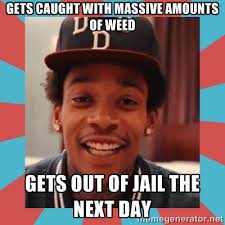Rivero, Daniel. “Pot Legalization in Oregon May Come with a Big Perk.” Fusion.net. Fusion Media Network, 14 July 2015. Web. 15 July 2015.
Daniel Rivero produces and reports written articles online over topics on general legal and justice related issues in America, while also the author of “Pot Legalization in Oregon May Come with a Big Perk” article. Mainly, the article refers to a new bill which will change marijuana regulations by erasing any marijuana-related criminal charges of citizens living in the state of Oregon and give America a chance to see the effects of the people within this state to determine if the implementation of this measure should occur beyond Oregon.
 The state of Oregon wishes to enact a bill that, eventually, will eliminate the past marijuana-related charges. This, in turn argued by Rivero, would free up the citizens of Oregon, mainly African American males, whose record remains tainted as a result of a marijuana-related charges, to pursue jobs that they could not pursue otherwise, stated by Rivero. As stated by Rep. Lew Frederick, a Democrat who initially created this bill idea, ”When you have a number of people, especially young black men, who are not eligible to get jobs – young black men, young black women – that affects everyone. If we can address that then we can begin to address a lot of other social issues,” Rivero addresses the suppression of African Americans in Oregon, specifically males, because of marijuana-related charges, since they get caught carrying this drug the most (pg. 11). The author admits that this one issue takes up too much time today with “social issues”, thus, we must focus on solving this one out as soon as possible to utilize our effectiveness as a society. A woman who actively researches at the Criminal Justice Policy Foundation, Alison Marqusee, speaks of various ways that the “petty” charges affect the African American community, spoken by Marqusee, “[The bill is] important because having a criminal record is extremely harmful to someone’s ability to find employment, to their ability to access public benefits, and sometimes for their ability to find affordable housing,” many in this community agree, as well as the author, that these charges most negatively affect people’s lifestyles in Oregon (pg. 7). If the bill were to pass, Oregon officials would liberate the lives of many people affected by marijuana charges in the past.
The state of Oregon wishes to enact a bill that, eventually, will eliminate the past marijuana-related charges. This, in turn argued by Rivero, would free up the citizens of Oregon, mainly African American males, whose record remains tainted as a result of a marijuana-related charges, to pursue jobs that they could not pursue otherwise, stated by Rivero. As stated by Rep. Lew Frederick, a Democrat who initially created this bill idea, ”When you have a number of people, especially young black men, who are not eligible to get jobs – young black men, young black women – that affects everyone. If we can address that then we can begin to address a lot of other social issues,” Rivero addresses the suppression of African Americans in Oregon, specifically males, because of marijuana-related charges, since they get caught carrying this drug the most (pg. 11). The author admits that this one issue takes up too much time today with “social issues”, thus, we must focus on solving this one out as soon as possible to utilize our effectiveness as a society. A woman who actively researches at the Criminal Justice Policy Foundation, Alison Marqusee, speaks of various ways that the “petty” charges affect the African American community, spoken by Marqusee, “[The bill is] important because having a criminal record is extremely harmful to someone’s ability to find employment, to their ability to access public benefits, and sometimes for their ability to find affordable housing,” many in this community agree, as well as the author, that these charges most negatively affect people’s lifestyles in Oregon (pg. 7). If the bill were to pass, Oregon officials would liberate the lives of many people affected by marijuana charges in the past.
 Along with the liberation of citizens’ lifestyles, Oregon jails will no longer contain people who dealt with marijuana, but people who committed non-”petty” crimes, such as theft. Rivero argues, “Several hundreds were sitting in state jails for doing something that was now considered legal,” again reinforcing this idea of liberating the citizens of this state. Since “recreational marijuana became legal on the first of this month”, changes seem to speed up rapidly in this state in comparison to others, as implied by Rivero. The suppression of African Americans in this state continues to emphasize itself “Black Oregonians are more than twice as likely to get arrested for marijuana than their white counterparts, found a American Civil Liberties Union study released in 2013,” a fairly recent study in which exploits the truth about race in relation to marijuana arrests (pg. 10). Once this bill passes, this trend of blacks getting incarcerated for menial charges would not continue, thus giving the African American community a chance to thrive in Oregon.
Along with the liberation of citizens’ lifestyles, Oregon jails will no longer contain people who dealt with marijuana, but people who committed non-”petty” crimes, such as theft. Rivero argues, “Several hundreds were sitting in state jails for doing something that was now considered legal,” again reinforcing this idea of liberating the citizens of this state. Since “recreational marijuana became legal on the first of this month”, changes seem to speed up rapidly in this state in comparison to others, as implied by Rivero. The suppression of African Americans in this state continues to emphasize itself “Black Oregonians are more than twice as likely to get arrested for marijuana than their white counterparts, found a American Civil Liberties Union study released in 2013,” a fairly recent study in which exploits the truth about race in relation to marijuana arrests (pg. 10). Once this bill passes, this trend of blacks getting incarcerated for menial charges would not continue, thus giving the African American community a chance to thrive in Oregon.
I found this article very useful, because I never realized the impact that legalizing marijuana in one state would place on the African American community. A drug viewed as restricting and dangerous by some, actually poses an opportunity for a community of citizens to liberate themselves and contain the opportunity to create their own lives and carry on the lifestyles they desire. Evidence points to other state officials within the United States finding this article the most useful. Within the text, Rivero points out a comment made by Marqusee, ‘“We hope that once this law goes into effect, it will help other states start from a better position when they are drafting legislation,”’ she said. ‘“It should be standard,”’ marijuana placed an astounding impact on this state’s community and laws. If the bill gets passed, the outcomes occurring in this state will be observed to see if these type of laws should exist beyond Oregon.
– RS 1 written by Ashley Bedford


